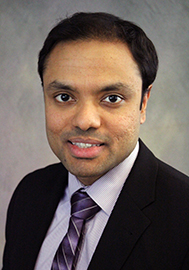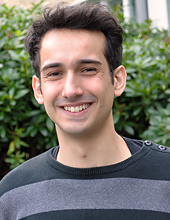- Date & Time: Friday, October 18, 2013; 12:00 PM
Speaker: Dr. Shreyas Sundaram, University of Waterloo
MERL Host: Mouhacine Benosman Abstract  This talk will describe a method to stabilize a plant with a network of resource-constrained wireless nodes. As opposed to traditional networked control schemes where the nodes simply route information to and from a dedicated controller, our approach treats the network itself as the controller. Specifically, we formulate a strategy where each node repeatedly updates its state to be a linear combination of the states of neighboring nodes. We show that this causes the entire network to behave as a linear dynamical system, with sparsity constraints imposed by the network topology. We provide a numerical design procedure to determine the appropriate linear combinations for each node so that the transmissions of the nodes closest to the actuators are stabilizing. We also make connections to decentralized control theory and the concept of fixed modes to provide topological conditions under which stabilization is possible. We show that this "Wireless Control Network" requires low computational and communication overhead, simplifies transmission scheduling, and enables compositional design. We also consider the issue of security in this control scheme. Using structured system theory, we show that a certain number of malicious or misbehaving nodes can be detected and identified provided that the connectivity of the network is sufficiently high.
This talk will describe a method to stabilize a plant with a network of resource-constrained wireless nodes. As opposed to traditional networked control schemes where the nodes simply route information to and from a dedicated controller, our approach treats the network itself as the controller. Specifically, we formulate a strategy where each node repeatedly updates its state to be a linear combination of the states of neighboring nodes. We show that this causes the entire network to behave as a linear dynamical system, with sparsity constraints imposed by the network topology. We provide a numerical design procedure to determine the appropriate linear combinations for each node so that the transmissions of the nodes closest to the actuators are stabilizing. We also make connections to decentralized control theory and the concept of fixed modes to provide topological conditions under which stabilization is possible. We show that this "Wireless Control Network" requires low computational and communication overhead, simplifies transmission scheduling, and enables compositional design. We also consider the issue of security in this control scheme. Using structured system theory, we show that a certain number of malicious or misbehaving nodes can be detected and identified provided that the connectivity of the network is sufficiently high.
-
- Date & Time: Wednesday, June 26, 2013; 12:00 PM
Speaker: Gabriel Rodrigues de Campos, Chalmers University
MERL Host: Mouhacine Benosman Abstract  In this talk, we consider a scenario where several vehicles have to coordinate among them in order to cross a traffic intersection. Thus, the control problem relies on the optimization of global cost function while guaranteeing collision avoidance and the satisfaction of local constraints. We propose a decentralized solution, where vehicles sequentially solve local optimization problems allowing them to cross, in a safe way, the intersection. Such approach pays a special attention to how quantify the degrees of freedom that each vehicle disposes to avoid a potential collision and lead to an adequate formalism in which collision avoidance is enforced through local state constraints at given time instants. Finally, simulations results on the efficiency, performance and optimality of the proposed approach are presented at the end of the talk.
In this talk, we consider a scenario where several vehicles have to coordinate among them in order to cross a traffic intersection. Thus, the control problem relies on the optimization of global cost function while guaranteeing collision avoidance and the satisfaction of local constraints. We propose a decentralized solution, where vehicles sequentially solve local optimization problems allowing them to cross, in a safe way, the intersection. Such approach pays a special attention to how quantify the degrees of freedom that each vehicle disposes to avoid a potential collision and lead to an adequate formalism in which collision avoidance is enforced through local state constraints at given time instants. Finally, simulations results on the efficiency, performance and optimality of the proposed approach are presented at the end of the talk.
-
 This talk will describe a method to stabilize a plant with a network of resource-constrained wireless nodes. As opposed to traditional networked control schemes where the nodes simply route information to and from a dedicated controller, our approach treats the network itself as the controller. Specifically, we formulate a strategy where each node repeatedly updates its state to be a linear combination of the states of neighboring nodes. We show that this causes the entire network to behave as a linear dynamical system, with sparsity constraints imposed by the network topology. We provide a numerical design procedure to determine the appropriate linear combinations for each node so that the transmissions of the nodes closest to the actuators are stabilizing. We also make connections to decentralized control theory and the concept of fixed modes to provide topological conditions under which stabilization is possible. We show that this "Wireless Control Network" requires low computational and communication overhead, simplifies transmission scheduling, and enables compositional design. We also consider the issue of security in this control scheme. Using structured system theory, we show that a certain number of malicious or misbehaving nodes can be detected and identified provided that the connectivity of the network is sufficiently high.
This talk will describe a method to stabilize a plant with a network of resource-constrained wireless nodes. As opposed to traditional networked control schemes where the nodes simply route information to and from a dedicated controller, our approach treats the network itself as the controller. Specifically, we formulate a strategy where each node repeatedly updates its state to be a linear combination of the states of neighboring nodes. We show that this causes the entire network to behave as a linear dynamical system, with sparsity constraints imposed by the network topology. We provide a numerical design procedure to determine the appropriate linear combinations for each node so that the transmissions of the nodes closest to the actuators are stabilizing. We also make connections to decentralized control theory and the concept of fixed modes to provide topological conditions under which stabilization is possible. We show that this "Wireless Control Network" requires low computational and communication overhead, simplifies transmission scheduling, and enables compositional design. We also consider the issue of security in this control scheme. Using structured system theory, we show that a certain number of malicious or misbehaving nodes can be detected and identified provided that the connectivity of the network is sufficiently high. In this talk, we consider a scenario where several vehicles have to coordinate among them in order to cross a traffic intersection. Thus, the control problem relies on the optimization of global cost function while guaranteeing collision avoidance and the satisfaction of local constraints. We propose a decentralized solution, where vehicles sequentially solve local optimization problems allowing them to cross, in a safe way, the intersection. Such approach pays a special attention to how quantify the degrees of freedom that each vehicle disposes to avoid a potential collision and lead to an adequate formalism in which collision avoidance is enforced through local state constraints at given time instants. Finally, simulations results on the efficiency, performance and optimality of the proposed approach are presented at the end of the talk.
In this talk, we consider a scenario where several vehicles have to coordinate among them in order to cross a traffic intersection. Thus, the control problem relies on the optimization of global cost function while guaranteeing collision avoidance and the satisfaction of local constraints. We propose a decentralized solution, where vehicles sequentially solve local optimization problems allowing them to cross, in a safe way, the intersection. Such approach pays a special attention to how quantify the degrees of freedom that each vehicle disposes to avoid a potential collision and lead to an adequate formalism in which collision avoidance is enforced through local state constraints at given time instants. Finally, simulations results on the efficiency, performance and optimality of the proposed approach are presented at the end of the talk.